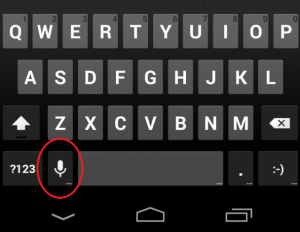 Here are 10 common English words that can be difficult to pronounce. How many can you say??
Here are 10 common English words that can be difficult to pronounce. How many can you say??
How about the word “hamburger”?
What other words are especially difficult for you to say?

Don’t say:
– I see you tomorrow.
– I go with you now.
– I do my homework next weekend.
– I tell you when she comes home.
– I call you Monday.
Say this:
– I’ll see you tomorrow. ![]() (I will see you tomorrow)
(I will see you tomorrow)
– I’ll go with you now.
– I’ll do my homework next weekend.
– I’ll tell you when she comes home.
– I’ll call you Monday.
Remember:
If you “think out loud“, you speak what you are thinking. If you sing out loud, you will improve your pronunciation.
The lyrics: Continue reading
 Smartphones can listen to you speak, and display your words. So can iPads and computers. If your phone can understand you, other people will probably understand you.
Smartphones can listen to you speak, and display your words. So can iPads and computers. If your phone can understand you, other people will probably understand you.
Practice your speech on iPhone or iPad
Practice on Android phone or tablet

When your phone can understand you, you can use your voice for … email, text messages, Siri questions on iPhones (“Hey Siri“), Google searches (“OK Google“), and more. Continue reading
You can go to the beginning of the video to hear more information about pronouncing each letter.
After you practice, take this test:
Singing along with music is a very good way to practice your English pronunciation. Here is a large collection of songs on a website called esl-bits.net. Many of the songs are slow, and easy to sing with. Each song has a separate page, with the music and words (lyrics), so that you can listen and sing too.
Note: On some smartphones, you may have to close the music window so you can see the words.
 A tongue twister is a set of words that are difficult to pronounce together – especially when you try to say them quickly. They are fun to try to speak, and can help improve your pronunciation.
A tongue twister is a set of words that are difficult to pronounce together – especially when you try to say them quickly. They are fun to try to speak, and can help improve your pronunciation.
For example, try saying this (slowly at first, and then faster):
Rubber baby buggy bumper
Or this one – to practice the TH sound:
Theopolis the thistle sifter thrust a thistle through his thumb.
Here is a collection of many more tongue twisters – easy, medium, and difficult.
— Thanks to Ekaterina for this article —
Last week there was an article about Regular Verbs and Their Spelling. The main spelling rule is that the past tense of all regular verbs ends with -ed.
However, the -ed ending is pronounced differently in different words…
![]() worked – sounds like workt (just one syllable)
worked – sounds like workt (just one syllable)
![]() cleaned – sounds like cleand (just one syllable)
cleaned – sounds like cleand (just one syllable)
![]() started – sounds like startid (2 syllables)
started – sounds like startid (2 syllables)